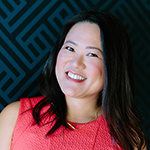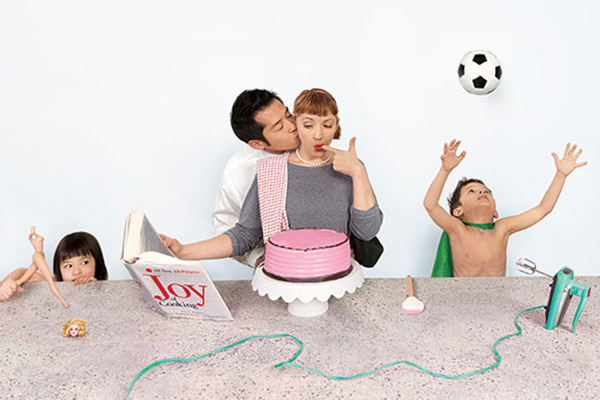I first read New York Magazine’s “The Retro Wife” article on my iPhone. The tiny photo on my on my screen showed a young red-haired woman, red lipsticked and draped in pearls, baking a cake, while her adoring husband and kids look on. From the article, I gathered that this latest examination of stay at home moms vs. working moms featured yet another professional young (presumably white) family. Only when I read it again on my laptop did I get a closer look at the photo and noticed that the husband, Alvin Makino, is Asian and the couples’ two young children are Hapa.
I read the article carefully again. Nowhere in the article does it mention the Makino family’s racial makeup.
Does it matter?
To the casual observer, maybe not. After all, this is a story of feminism and gender roles, not about race.
To a woman who wrestles with the competing influences of family culture, peer culture, and the realities of making ends meet and maybe even having a successful and fulfilling career at the same time, race and culture matter very much. I’ve written before about how the statistics for mothers who work outside the home compared to mothers who raise children full-time vary greatly by race.
As a new mom, I wrestled with the decision to go back to work 40 hours a week or to stay home and care for my baby full time. The books and articles I read gave me conflicting advice, as did my friends who already had children. The messages fell into two camps: either motherhood is a woman’s most fulfilling work in life or that career and financial stability are anyone’s (male or female) greatest responsibility. Nowhere was the dichotomy more clear than between the advice I received from the two sides of my family: my husbands’ and my own.
You might assume that Asian culture is traditional and patriarchal, hence my family would be in support of me staying home to cook, clean and take care of the children, right?
Wrong.
My parents came to America as a result of the Immigration Act of 1965. Like most Asians who entered the country as under this law, they were only eligible to come to the United States under student or work visas which required expertise in science and engineering. In other words, a stable job in a STEM field was their meal ticket. They encouraged both my brother and I to study hard, get good jobs, and ensure our stable futures.
As I read the New York Magazine piece, this passage about Alvin Makino’s perspective on family life is the only glimpse into how his own childhood colored the way he approached being a father:
when Alvin envisioned their collective future, he thought, “Oh, it’s totally not going to be like my parents. We’re going to do things equally. Both of us are working, and we’ll take care of the kids together. It just seemed so simple in my mind.”
So perhaps Alvin Makino did grow up with stereotypical gender roles. Was it because of his heritage or just some quirk of his own parents? What do the Makino grandparents think of Kelly’s decision to quit her job and become a “retro wife”? Did culture influence the Makinos’ lifestyle changes? Perhaps it didn’t, and I’m just projecting my own experiences on to this story. But because issues of culture and tradition were not mentioned in the article, we’ll never know.
Here’s my question to you: when reporters are doing a story about an Asian family, should they drill down into the cultural influences? Or do you think that culture is not an issue in this article at all?


Culture is an issue in every single issue, but not necessarily the way you’re thinking. Family culture is unique and diverse and influence all our decisions. I personally think it’s awesome that they didn’t mention race because it means that we’re at a point where it doesn’t HAVE to be mentioned. The assumption is that the families they came from had views and those could be any views, not ALL asians or All hispanics, or ALL whites think a certain way.
My husband is Hispanic, a culture where wives stereotypically stay home and cook and clean, yet my mother-in-law was always a professional – she was also from an upper-class family with servants and so on. My husband always expected me to work and to have a full-time nanny. My mom is college educated and currently works, but she stayed home until I, the last child, was 8 yrs old. I always expected that when kids came into the picture my career would go on the back burner until they were older. Our family cultures were much more important that the dominant cultures of the countries we lived in.
Yeah for color-blind!
Nope, the only relevant culture in this article seems to be American culture. Besides, it’s 2013, and Asian Americans have been here long enough that its time to stop thinking of them as perpetual foreigners.
And even if we did think of Asians as foreigners, it’s not like they all come from one monolithic culture. Too often, I hear/read comments referring to traditional Asian culture as repressive/conservative etc. And that cracks me up because the traditional Asian culture I’m familiar with is what many Americans might consider rather progressive, with matriarchal tendencies.
A person can be very much American and still hold on to their cultural traditions. Also, if you read what I wrote above, I very much pointed out that my Asian parents very much emphasized education and career for both boys and girls.
I wrote this big long response about it focused exclusively on her views and culture because she was justifying her actions because it would be impossible for them to live on her income rather than his and have the father stay home.
But I ended up getting pissed at her for asserting mothers were better at child-rearing because girls played with dolls, and women were more tolerant and patient than men. Gag me.
Yes, as I’m thinking about this story I agree that her statements about women being naturally more nurturing are a distraction from the issue that is more important for society to deal with– that women so often earn much less than men and financially it makes more sense for the higher-wage earner to be the breadwinner, if only one spouse works.
I am not sure what to think about the article. Sorry! I will tell you that my mother, being a Latina, was brought up with the belief that women stayed home to cook, clean and raise their children. Now my adopted American father’s mother, too, was brought up with the same idea (indluding that the husband managed all the money). But I decided a very long time ago that I would not get stuck in the kitchen or being solely responsible for the house chores.
I did stay home for a while and raised my children, I cooked, cleaned, and even homeschooled them, but my husband always helped out where I needed the filling in. And when my children were in high school (still homeschooling but on their own), I went back to work outside of the home. My husband and I did then split the home’s and family reponsibilites equally.
Thanks for sharing the article — I hadn’t come across it and found it to be an interesting read.
So my initial reaction to your question was “Uh, YEAH!” but after actually READING the article, I think culture should only be drilled down by a reporter if it’s actually drilled down by the subjects of the article. So the lack of speaking to the ethnic make up of the family may just reflect the fact that it didn’t come up or the family didn’t bring it up. I think everyone perceives and embraces culture to varied degrees in varied settings at varied levels of comfort. To the point where I have had a couple that I would call “interracial” — Chinese American wife, White American husband — tell me they do not see themselves as an interracial couple. And I’ve had parents — White American husband, Nigerian/Yoruba British wife — completely shut me down when I asked how they address racial issues that come up with their school-age children (and these are people I’m close with not strangers off the street for all of you wondering).
You already know I’m OCD (Obsessed With Culture Disorder) and I think reporters should address culture, but in a way that’s authentic and organic and welcome by the people who are actually telling their story.